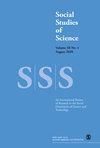超越采样:重新思考暴露科学领域
IF 2.7
2区 社会学
Q1 HISTORY & PHILOSOPHY OF SCIENCE
引用次数: 0
摘要
随着工业资本主义在全球的蔓延,环境污染的形式也多种多样,因此迫切需要对许多化合物对人类和非人类的潜在毒性进行广泛评估。然而,为进行此类评估而开发的科学程序存在若干重大缺陷,大大削弱了其保护高危人群的能力。本文将通过对智利北部两个以污染场地评估为中心的实地考察活动进行人种学分析,揭示这些活动中存在着我们可以称之为取样主义的问题。与将实地工作视为知识创造的生成空间的方法相反,取样主义从根本上将实地工作简化为收集单一、明确的实验室样本的中性空间。然而,取样主义会导致与评估污染水平相关的多种实地现象被完全忽略,从而大大削弱了暴露科学帮助改善有需要者生活的整体能力。因此,暴露科学亟需开发更多的实地参与形式,一种真正代表当代污染和破坏过程背后复杂力量和过程的生态实地工作。本文章由计算机程序翻译,如有差异,请以英文原文为准。
Beyond samplism: Rethinking the field in exposure science
Given the many forms of environmental pollution that have accompanied the global spread of industrial capitalism, there is an urgent need to carry out extensive assessments of the potential toxicity of many compounds on human and nonhuman populations. However, the scientific procedures developed to carry out such assessments present several critical shortcomings that greatly diminish their capacity to protect populations at risk. Through an ethnographic analysis of two field campaigns centered on the assessment of polluted sites in northern Chile, this article will reveal that these campaigns are embedded in what we can call samplism. Contrary to approaches that see fieldwork as generative spaces for knowledge creation, samplism radically simplifies the field into a neutral space for the collection of singular and well-defined lab-bound samples. However, samplism entails that multiple field phenomena relevant for assessing pollution levels are left completely unaccounted for, which greatly diminishes exposure science’s overall capacity to help improve the lives of those in need. Thus, exposure science urgently needs todevelop more capacious forms of engagement with the field, an ecological fieldwork that truly represents the complexity of forces and processes behind contemporary processes of pollution and damage.
求助全文
通过发布文献求助,成功后即可免费获取论文全文。
去求助
来源期刊

Social Studies of Science
管理科学-科学史与科学哲学
CiteScore
5.70
自引率
6.70%
发文量
45
审稿时长
>12 weeks
期刊介绍:
Social Studies of Science is an international peer reviewed journal that encourages submissions of original research on science, technology and medicine. The journal is multidisciplinary, publishing work from a range of fields including: political science, sociology, economics, history, philosophy, psychology social anthropology, legal and educational disciplines. This journal is a member of the Committee on Publication Ethics (COPE)
 求助内容:
求助内容: 应助结果提醒方式:
应助结果提醒方式:


